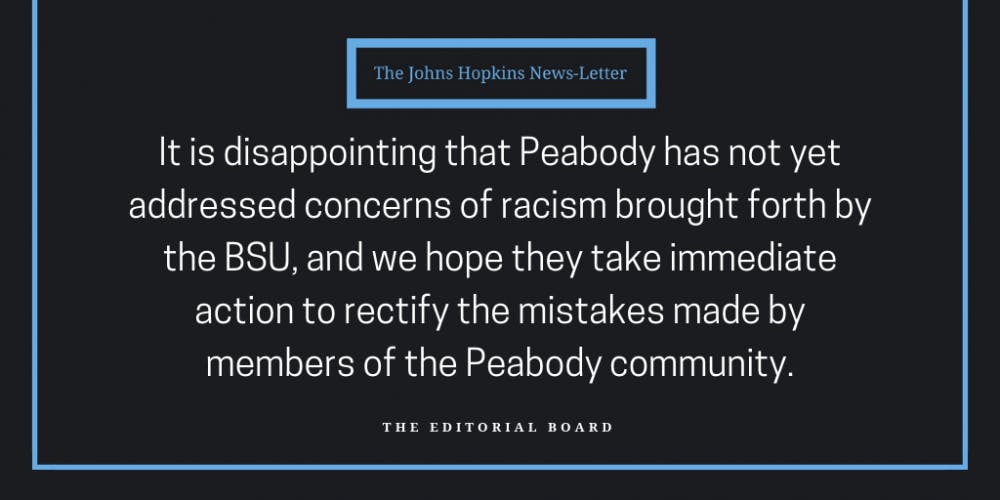In January, the Black Student Union (BSU) at the Peabody Institute filed a complaint with the Office of Institutional Equity against its Student Affairs office, expressing concerns about racial discrimination against black students.
Our sources have alleged that other students and faculty have used racial slurs against black students. They’ve also alleged that faculty have failed to report incidents of discrimination within their classes, even when they were mandated reporters. When bringing forward concerns about discrimination that they experienced at Peabody, students found that administrators were unresponsive.
In an email to The News-Letter, Peabody’s Student Affairs office stated that they have met with BSU members and take their concerns seriously. The office also noted the increase in minority students and faculty. We question whether these efforts are enough, given the hostile environment described by several black students at Peabody. Last year, Peabody relaunched its jazz program after the departure of its founding director Gary Thomas. Thomas was one of two black faculty members in the program at the time and cited discrimination as a reason for his departure.
Concerns about discrimination at Peabody reflect broader racial trends in music programs nationwide. Starting a career in music is often expensive, and lack of diversity in music programs is a persistent problem. Research shows that students from low-income families generally do not pursue music degrees. Moreover, music programs are often unavailable in low-income communities of color. That means that there are limits to how socioeconomically or racially diverse a music program can be. Indeed, classical music — a priority at Peabody — has historically been white-dominated, with black musicians making up only 1.8 percent of orchestras nationwide.
Moreover, Western-emphasized classical music remains the primary genre at Peabody and conservatories nationally, with styles such as jazz put on the back-burner. That is not conducive for an inclusive culture for musicians of color.
We acknowledge that Peabody has been taking steps toward resolving the issues. The 2018-2019 school year has seen an increase in both admitted students and faculty members who are minorities.
It is also true that the University has made some efforts in recent years to make Peabody more inclusive. On March 12, University President Ronald J. Daniels announced in a university-wide email that Dean Fred Bronstein, who has led the conservatory since 2014, has been reappointed for a second term.
In his email, Daniels praised Bronstein’s efforts toward “equity and inclusion in the arts.” We acknowledge that Bronstein has made efforts to make Peabody more diverse. But we are troubled by the allegations of racial harassment that took place under his leadership. If Bronstein is concerned with making Peabody a more diverse and inclusive institution, then why did these incidents occur?
We commend Peabody for some of its initiatives in trying to promote diversity, specifically with programs within its Preparatory, which offers classes to Baltimore community members. For example, the Music Teacher Mentoring Program provides mentoring to public school music teachers in Baltimore City Schools. The Tuned-In Program funds music lessons and other opportunities for talented Baltimore City youth. But it’s clear that these initiatives and the way they are implemented need to be more robust. Existing policies are a step in the right direction, and it’s important to strengthen these programs. But faculty must also be properly trained so that students of color do not feel alienated from their own school.
In addition to administrative changes to address diversity, a revision of course listings should also be considered. On the national level, conservatories do not do enough to highlight a diversity of musical genres. Western classical music remains the prominent style of study. One of our student sources could only name African Drumming as a non-Western or non-jazz course that is offered at Peabody.
Peer institutions have already started fundamental initiatives to diversify course listings. The Berklee College of Music recently launched the Africana Studies Program, Planet MicroJam Institute, American Roots Music Program and Mediterranean Music Institute in order to offer a greater range of courses with different musical styles. Cornell also shifted its curriculum to break out of the Western classical mold.
We recommend that Peabody work to emulate our peer institutions. Making Peabody inclusive goes beyond creating task forces and scholarships. Instead, the institution must fundamentally change its curriculum and core system. Creating more diverse elective requirements could also serve as an inclusive factor for the current and future Peabody students who want a more expansive scope of music taught at the institute.
This is only the first of many steps that Peabody can take to address issues of diversity. Diverse course listings and a diverse student body will lead to a more inclusive environment that welcomes and celebrates artists of color. It is disappointing that Peabody has not yet addressed concerns of racism brought forth by the BSU, and we hope they take immediate action to rectify the mistakes made by members of the Peabody community.
In the past months, students at Homewood have actively fought for the rights of students of color. The most obvious testament to that is the Garland sit-in — students continue to be vocal in their protests against a private police force that may racially profile students. It’s important, however, for students to also look beyond issues that affect our own campus. If we are to fight discrimination we must look to all the Hopkins divisions, especially those that do not have the necessary numbers or resources to make their voices heard.





